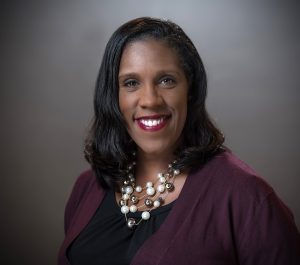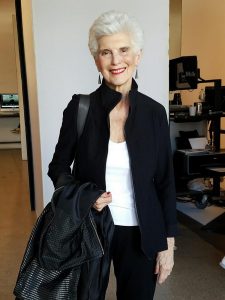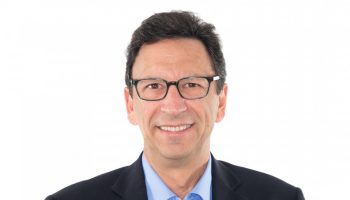There’s no time like the present to come forward and take a stand for a world in which power and possibility for females — regardless of class, race, sexual identity, age or any other factor — are equal to that for males.
So say Marie C. Wilson and Teresa C. Younger, honorary founding mother and president emerita, and current president and CEO, respectively, of the oldest women’s foundation in the United States, the Ms. Foundation for Women.

At 2 p.m. Saturday in the Hall of Philosophy, Wilson and Younger share the podium. They will talk about “Stepping Up and Speaking Out: Women in Politics and Society in America,” as part of the Chautauqua Women’s Club’s Contemporary Issues Forum series, spearheaded by the late Mary Ann Jenkins McCabe.
According to Younger, Wilson will be giving the first quarter of their presentation, tying in the history of Chautauqua to the women’s movement. Younger said she will be speaking more broadly about political diversity, the “richness of women of color” and Ms. Foundation’s new strategic plan.
The Ms. Foundation for Women was established in 1973 to provide funding and strategic resources to organizations across the United States through which women and girls are leading the transformation toward the vision of an equal and just nation.

Wilson, an entrepreneurial and award-winning women’s advocate, political organizer, book author and Huffington Post contributor, is known to many Chautauquans. Not only has she returned previously as both a CIF and a Chautauqua Professional Women’s Network speaker due to popular demand, but she and her family have become Chautauquans themselves.
As the director of women’s programs at Drake University in Des Moines from 1978 to 1981, Wilson developed and administered educational programs and services for women entering and re-entering the workforce, and started practical career-related programs for women in the community, including minority women. Over this three-year period, her university-based women’s program became the largest in the United States, serving 3,000 women annually.
In 1981, the 650-member Iowa Bankers Association hired Wilson as director of education and human resources and promoted her to vice president. In 1983, she was elected as the first woman to serve on the Des Moines City Council as a member-at-large. The following year, before Wilson completed her term as council member, the Ms. Foundation for Women recruited her to be its first president. She served in this capacity for 20 years, from 1984 to 2004.
While leading the Ms. Foundation, Wilson established the Collaborative Fund for Women’s Economic Development, which pioneered and supported collaborative funding circles and micro-enterprise programs for low-income women. She created the foundation’s first endowment ($17 million) and launched a five-year, $50 million endowment campaign.
One of America’s most successful and enduring national public education campaigns owes its existence to Wilson. In 1992, she conceived the Take Our Daughters to Work Day. It became such a hit that it is observed annually on the fourth Thursday in April, and was broadened to Take Our Daughters and Sons to Work Day. It is also celebrated around the world in more than 200 countries.
To honor her accomplishments, the Ms. Foundation included Wilson with its group of four “Founding Mothers” — Patricia Carbine, Letty Cottin Pogrebin, Gloria Steinem and Marlo Thomas — and established The Marie C. Wilson Leadership Fund.
Wilson founded The White House Project in 1998 “in order to build a richly diverse, genuinely representative democracy,” according to her HuffPost bio. She served as its president until 2011. The mission of this nonprofit organization was to train women candidates and activists in order to advance women’s leadership in all spheres, including cultural, economic, social and political, all the way up to the presidency of the United States.
According to Wilson, the “ultimate goal is to transform American culture so that the number of women leaders in all sectors achieves a critical mass.”
As part of this work, The White House Project conducted research — “Benchmarking Women’s Leadership” — in multiple sectors. It was completed in 2009 and updated in 2013 by the Colorado Women’s College at University of Denver, its research partner.
Although The White House Project closed in 2013 because of fundraising challenges, two of its major initiatives are going strong. Its outgoing president started another organization — VoteRunLead — to continue the project’s political leadership training. Wilson serves on its advisory board.
The White House Project also launched SheSource.org, a database of women experts with media experience, which has since become part of the Women’s Media Center, co-founded by Steinem. WMC connects these experts to journalists, bookers and producers.
“Marie is the longest serving president and CEO of the Ms. Foundation,” Younger said. “She has a strong understanding of politics. My background is in organizing; most recently in state organizing.”
For her organizing, activism and advocacy, particularly concerning women’s health, safety and economic justice, Younger has received notable honors and awards, including being named by Inside Philanthropy as one of the “50 Most Powerful Women in Philanthropy.”
Younger serves on numerous boards and committees, including Black Funders for Social Justice, the ERA Coalition, the Women’s Campaign School at Yale, and the NYS Council on Women and Girls. She said she was on the board of the Girl Scouts of Connecticut for one year before being elected its chair and serving for four more years.
“I am a lifetime Girl Scout and a Girl Scout award recipient,” Younger said. “Girl Scouts is very much a part of who I am and my values.”
When she was 11, her father, who in the Air Force, was stationed in North Dakota.
“I knew more about farming than feminism,” she said. “ ‘GS’ stood for Girl Scouts rather than Gloria Steinem.”
Growing up, Younger thought she’d work for the United Nations. She participated in the North Dakota Girls State summer leadership and citizenship program for high school juniors and was elected governor.
As a first-generation college student at the University of North Dakota, Younger said the expectation was that she pay for school herself and that she take on leadership roles. Starting out with a focus on peace studies, she was politically active. In addition to serving as vice president of the student body during her junior year, she worked on two statewide campaigns, one of which was to establish Martin Luther King Jr. Day.
Needing a break after her third year, Younger worked as a nanny for two years in Stamford, Connecticut.
“I learned an amazing way of influencing children and setting them up to change the world,” she said.
Thinking strategically about her college major, Younger said she switched to recreation, which included finance and business-related courses. Her first job after earning her bachelor’s degree was as the executive assistant to the executive director of the American Camp Association. There she worked with the children’s residential camp directors all over the New England states.
Younger said she left the ACA to run Morry’s Camp, a free residential summer camp for inner-city children that addresses the academic challenge of summer learning loss. Project Morry was established in 1995 in memory of “camping world hero” Maurice Stein by his friends, colleagues and family.
Her experience as the executive director of Morry’s changed Younger’s career focus from recreation to juvenile justice and reproductive rights policies. Initially, she joined Changing Our World, a fundraising consultancy committed to impassioned advocacy and social impact, as its senior director of the corporate philanthropy division.
When offered the position of executive director of the American Civil Liberties Union of Connecticut arose, she accepted. Younger said she was able to get involved in organizing, including reaching out to Southeast Asian women about the problem of domestic violence. As the ACLU’s membership grew, she said she realized the importance of women in gaining the acceptance of men and of communities.
In 2005, Younger became the director of affiliate organizational development for the ACLU’s national organization. She said she spent two years ensuring that the executive director in each state was qualified to do the work needed, and she helped the ACLU build the boards of its affiliated offices all over the United States.
Drawn to grassroots work, Younger next served for nearly eight years as the executive director of the Connecticut Permanent Commission on the Status of Women. There, she concentrated on policy, including the state’s minimum wage, collective bargaining, the number of women on boards, domestic violence, permits to carry guns, breastfeeding in the workplace and child care subsidies.
“It was an amazing opportunity to educate and empower women in the state of Connecticut and legislators who were like-minded to work on policies that make lives better,” Younger said.
Younger has been serving as the CEO and president of Ms. Foundation for Women since June 2014. As part of the process for developing the foundation’s 2018-2022 strategic plan, she said she traveled 56,000 miles across the United States from 2014 to 2015 on a “listening tour” to learn about people’s concerns about feminism and their objections and concerns regarding gender equity.
“It’s probably the greatest gift I was ever given — to meet people that way,” Younger said. “I trust the grassroots, as does the Ms. Foundation.”
Under her guidance, the Foundation initiated a multimedia campaign — #MyFeminismIs — prompting a national conversation about feminism.
It has also funded a major report on the sexual abuse to prison pipeline, joined the “Prosperity Together” $100 million funding commitment by leading women’s foundations to create pathways to economic opportunity for low-income girls and women, and led a campaign to hold the NFL accountable for violence against women.
Led by Younger, the Ms. Foundation for Women has indeed been stepping up and speaking out.




